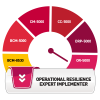Concentration Risk
1. Concentration Risk in operational resilience refers to the vulnerability and potential impact that arises from a significant dependence or concentration of critical operations, resources, or dependencies within an organization. It occurs when there is an overreliance on a single point of failure or a limited number of entities, systems, or processes that, if disrupted, could significantly impact the organization's ability to deliver its critical services or functions.

Notes (1): Geographic Concentration: The organisation relies heavily on a single geographic location for its operations, which exposes it to risks associated with regional events or disruptions, such as natural disasters, political instability, or infrastructure failures. Notes (2): Vendor Dependency: The organisation depends on a limited number of vendors or service providers for critical services or resources. If these vendors experience disruptions, it can lead to a significant impact on the organization's operations. Notes (3): Technology Concentration: The organisation heavily relies on a specific technology infrastructure, system, or platform, making it vulnerable to disruptions or failures in that technology. This includes single points of failure, lack of redundancy, or outdated systems. Notes (4): Human Resource Dependency: The organization heavily relies on specific individuals or teams with specialized knowledge or skills. If these individuals are unavailable due to absences, resignations, or other factors, it can lead to operational disruptions. Notes (5): Single Business Process Dependency: The organization relies heavily on a single business process or a limited number of interconnected processes. A disruption in this process or its dependencies can have a cascading effect on the organization's ability to deliver critical services. Notes (6): MAS BCM Policy dated 22 June 2022 highlight the need to address concentration risk. This involves identifying and assessing areas of significant reliance or concentration and implementing measures to mitigate the potential impact of disruptions. These include and relate to primary-secondary site operation, critical business functions segregation, split team and backup team arrangements cross-training cross-border support, and alternative service provider considerations and requirements of the MAS BCM Policy. 
| ||||||||||||||||||||||||||||||||||||

